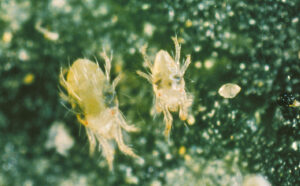Written by: Tracey Baute, Field Crop Entomologist, OMAFRA, Dr. Vojislava Grbic, Associate Professor, Western University and Dr. Ian Scott, Research Scientist, AAFC-London

With the exception of the significant rain events in the last week, this year’s hot, dry conditions and early wheat harvest could be priming us for another bad spider mite season in soybeans and dry beans. Over the last few years, two-spotted spider mite (TSSM) infestations have been challenging to manage. In some cases, infestations were missed or misidentified as drought stress and were not caught in time before populations were very high and crop injury was evident. In other cases, applications of dimethoate (Lagon® or Cygon®) were not successful and populations continued to thrive.
Some applications are not successful at reducing populations due to a large portion of mite eggs being present on plants during application. Dimethoate only controls adults and nymphs so these eggs hatch a few days after application and start new infestations. In recent years though, some application failures have been due to dimethoate resistance. Samples taken to AAFC-London and Western University found some TSSM populations in Ontario are no longer susceptible to dimethoate. The extent of this resistance is not yet known but through collaborative research with Western University, AAFC – London and OMAFRA, we hope to understand the extent of the resistance. Currently, dimethoate is the only active ingredient registered for spider mites in soybeans and dry beans, so this finding is very concerning. It also increases our need to test these populations to find what alternative products are still effective and can be registered quickly.
If you find any spider mite populations in soybeans or dry beans before an application is made (preferable), or after a dimethoate application has been made but was not successful at controlling the population, please contact Tracey Baute (contact info below). Samples will be taken back to the lab for testing and field information gathered to gain insights into these resistant populations. Fields with a history of spider mite problems or fields close to greenhouse operations are of special interest since they could influence what products they have been previously exposed to.
Funding for this project is provided by The Grain Farmers of Ontario (GFO), Ontario Greenhouse Vegetable Growers and MITACS, and the Ontario Research Fund.
For more information about this project or to notify us of field sites with spider mite populations to take samples for testing, contact: Tracey Baute, Field Crop Entomologist – OMAFRA at tracey.baute@ontario.ca or 519-360-7817